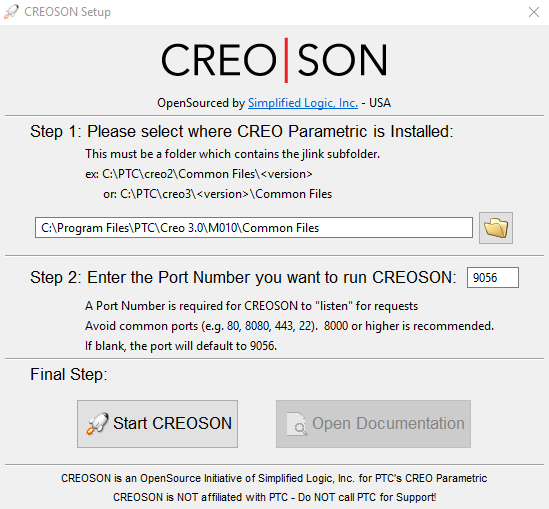Usage¶
Quickstart¶
- Download last release of Creoson Server for your system.
- Run CreosonSetup and configure it with your Creo’s version.

If you want to launch Creo with Creoson, please create a nitro_proe_remote.bat file.
You can copy C:\Program Files\PTC\Creo x.x\Mxxx\Parametric\bin\parametric.bat and rename it nitro_proe_remote.bat anywhere you want.
To use Creopyson in a project:
import creopyson
Create a Client object and create a connection with Creoson:
c = creopyson.Client()
c.connect()
Verify is Creo is running:
c.is_creo_running() # Return a boolean.
Launch Creo:
c.start_creo("path to nitro_proe_remote.bat")
Basic usage:
current_directory = c.creo_pwd() # return current working directory.
listfiles = c.creo_list_files() # return a list in the working directory.
listdirs = c.creo_list_dirs() # return a list of folders in the working directory.
c.creo_cd("new_folder") # change working directory.
c.file_exists("my_file.prt") # verify if `my_file.prt` exists.
c.file_open("my_file.prt", display=True) # Open `my_file.prt` in Creo.
c.dimension_set("my_file.prt", "diamm", 180) # Modify `diamm` dimension.
c.file_regenerate("my_file.prt") # Regenerate file, raise `Warning` if regeneration fails.
Creo 7 Users¶
If you are using Creo 7 you must declare it once per session to prevent errors on deprecated features:
c.creo_set_creo_version(7)
«Vanilla» Creoson usage¶
mostly for debugging:
import creopyson
c = creopyson.Client()
c.connect()
# Here you define command/function
# data is a dictionnary with data part of the JSON request
# Please refer to Creoson documentation
command = "file"
function = "open"
data ={"file":"my_file.prt", "display": True}
result = c._creoson_post(command, function, data)
result would be the data part of Creoson’s response:
{'dirname': 'C:/your/working/path/', 'files': ['my_file.prt'], 'revision': 1}
Logging basic usage¶
If you want see what are the requests to Creoson you should activate logging this way:
import logging
logging.basicConfig(level=logging.DEBUG)
# Hide urllib3 logging
logging.getLogger("urllib3").setLevel(logging.WARNING)
import creopyson
c = creopyson.Client()
c.connect()
c.file_open("my_file.prt", display=True)
The result in you console would be something like this:
DEBUG:creopyson.connection:request: {'sessionId': '', 'command': 'connection', 'function': 'connect', 'data': None}
DEBUG:creopyson.connection:response: {'status': {'error': False}, 'sessionId': '-8685569143476874454'}
DEBUG:creopyson.connection:request: {'sessionId': '-8685569143476874454', 'command': 'file', 'function': 'open', 'data': {'display': True, 'activate': True, 'file': 'my_file.prt'}}
DEBUG:creopyson.connection:response: {'status': {'error': False}, 'data': {'revision': 1, 'files': ['MY_FILE.prt'], 'dirname': 'C:/your/working/path/'}}

